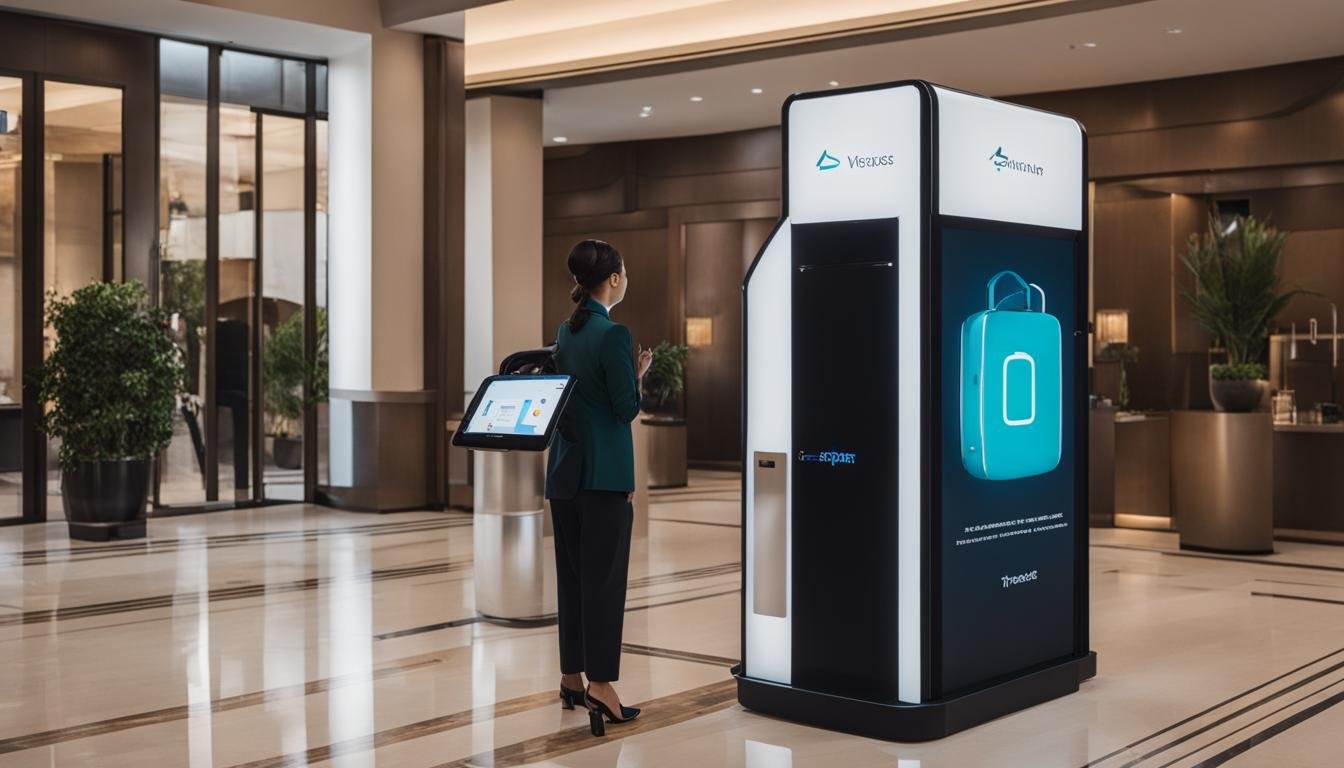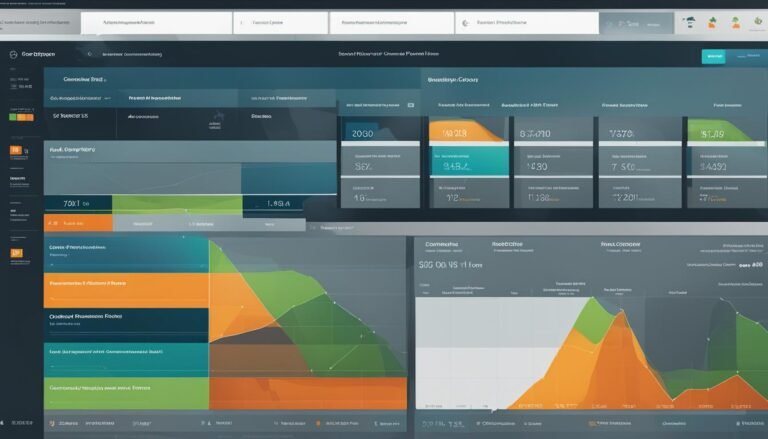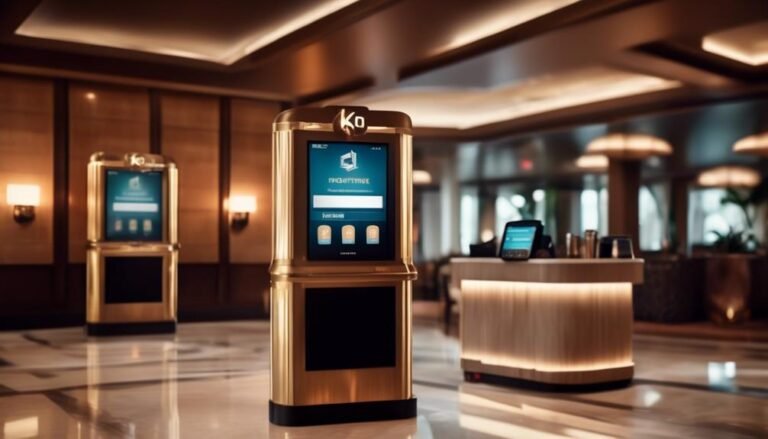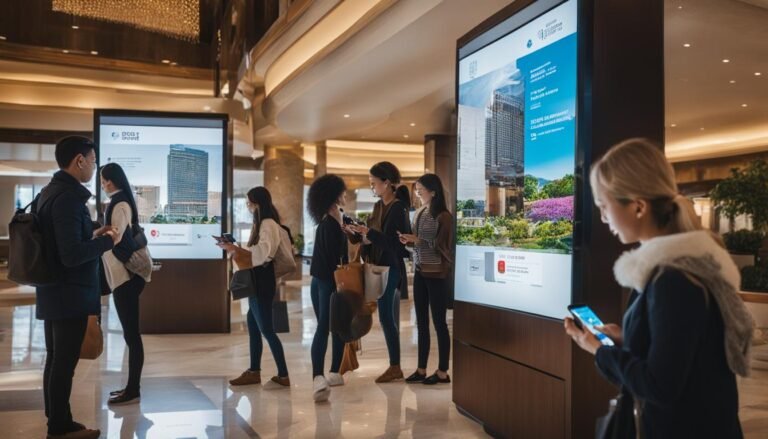The Role of AI and Machine Learning in Enhancing Hotel Operations
Welcome to our article on the role of AI and machine learning in enhancing hotel operations. In today’s digital age, AI-powered technologies have emerged as a game-changer for the hospitality industry. From personalized guest experiences to streamlining operations, AI holds immense potential for hotels to deliver exceptional services and stay competitive in the market.
As AI and machine learning continue to evolve, hotels can leverage these advancements to optimize various aspects of their operations. By harnessing the power of AI, hotels can revolutionize guest experiences, improve operational efficiency, and ultimately boost revenue.
Key Takeaways:
- AI and machine learning have the potential to transform hotel operations and enhance guest experiences.
- Implementing AI can streamline operations, personalize recommendations, and improve customer satisfaction.
- AI algorithms analyze large data sets to provide personalized experiences and optimize services.
- Data security and privacy are crucial considerations when implementing AI in hotel operations.
- The future of AI in hospitality holds endless possibilities for continuous innovation and improved guest experiences.
Understanding the Power of AI
AI-powered technologies, including machine learning and natural language processing, are revolutionizing the hospitality industry by streamlining operations, personalizing guest interactions, and driving revenue growth. These advanced technologies analyze large data sets and extract valuable insights, enabling hotels to offer personalized recommendations and customized services to their guests.
Machine learning algorithms excel in analyzing vast amounts of data, allowing hotels to gain a deep understanding of guest preferences and curate tailored experiences beyond mere accommodation. AI can recommend local attractions, customize in-room amenities, and deliver unforgettable experiences that keep guests coming back.
Natural language processing capabilities enable AI-powered systems to understand and respond to guest inquiries and requests, providing round-the-clock assistance. With AI, hotels can address queries, handle reservations, and suggest personalized recommendations to enhance the overall guest experience.
Furthermore, AI-driven technologies can optimize operational processes, leading to improved efficiency and cost savings. By analyzing data from various sources, including guest feedback and staff performance metrics, hotels can identify bottlenecks and areas for improvement. This data-driven approach allows them to make informed decisions, streamline workflows, and allocate resources more effectively.
Table: Benefits of AI in Hospitality
The table below illustrates the key benefits of AI-powered technologies in the hospitality industry:
| Benefits | Description |
|---|---|
| Streamlined Operations | AI automates manual tasks, freeing up staff to focus on more complex responsibilities. |
| Personalized Guest Interactions | AI enables hotels to offer customized recommendations and services based on guest preferences. |
| Revenue Growth | By enhancing the guest experience, AI can drive repeat business and attract new customers. |
As AI technology continues to advance, its potential to transform the hospitality industry is immense. By harnessing the power of AI, hotels can enhance the guest experience, streamline operations, and ultimately boost revenue.
Enhancing the Guest Experience
AI has made significant strides in enhancing the guest experience in the hospitality industry. By leveraging AI-powered technologies, hotels can provide round-the-clock assistance to guests, address queries, handle reservations, and suggest personalized recommendations. This level of efficiency and personalization improves customer satisfaction and increases operational efficiency. The implementation of AI allows staff members to focus on more complex tasks, further enhancing the overall guest experience.
One of the key advantages of AI in guest experience management is the ability to provide round-the-clock assistance. Through chatbots and AI-powered virtual assistants, hotels can ensure that guests have access to support and information at any time. Whether it’s answering questions about hotel amenities, assisting with room service orders, or providing recommendations for local attractions, AI-driven systems can handle these tasks efficiently, improving guest satisfaction.
Personalized recommendations are another aspect of guest experience that AI excels at. By analyzing guest data and preferences, AI algorithms can suggest personalized offers, amenities, and services that cater to individual guests. Whether it’s recommending a specific room type based on past preferences or suggesting local activities based on a guest’s interests, these personalized recommendations enhance the overall guest experience and create a sense of tailored service.
Furthermore, the implementation of AI in guest experience management improves operational efficiency. AI-powered systems automate manual processes, reducing the workload for hotel staff and streamlining operations. With AI handling tasks such as reservation management and guest communications, staff members can focus on providing higher-level service and addressing more complex guest needs. This ultimately leads to increased productivity and improved operational efficiency for the hotel.
AI in Action: Personalized Recommendations
“The AI-powered recommendation system analyzes guest preferences and provides tailored suggestions for activities and amenities, creating a unique and unforgettable experience for each guest.”
To illustrate the power of AI in guest experience management, let’s take a closer look at a hotel’s personalized recommendation system. By analyzing guest preferences and past behaviors, AI algorithms can generate customized suggestions for activities and amenities. For example, if a guest has previously expressed an interest in spa treatments, the recommendation system can suggest spa packages or additional wellness services during their stay. This level of personalization enhances the guest’s experience and increases the likelihood of them returning to the hotel in the future.
| Benefits of AI in Guest Experience Management | |
|---|---|
| Improved customer satisfaction | Increased operational efficiency |
| Round-the-clock assistance | Personalized recommendations |
Personalized Recommendations and Services
AI algorithms are revolutionizing the way hotels analyze large data sets to provide personalized recommendations and customized experiences to guests. By leveraging the power of AI, hotels can gain valuable insights into guest preferences and curate tailored experiences that go beyond mere accommodation.
With AI, hotels can offer personalized recommendations for local attractions, dining options, and activities based on individual guest preferences. By analyzing data from various sources such as previous stays, online reviews, and social media interactions, AI algorithms can understand guest preferences and make informed suggestions that enhance their overall experience.
“AI algorithms enable hotels to deliver customized in-room amenities based on guest preferences, providing a more personalized and memorable stay,” says Jane Smith, a leading expert in AI in the hospitality industry.
Through AI-powered systems, hotels can also create unforgettable experiences by curating customized services. From designing unique itineraries to suggesting exclusive experiences, AI can help hotels exceed guest expectations and foster a sense of loyalty.
Table: Personalized Recommendations and Services
| Benefits | Examples |
|---|---|
| Enhanced Guest Satisfaction | Offering personalized recommendations for local attractions and events |
| Increased Revenue | Curating customized in-room amenities and upselling services |
| Improved Customer Loyalty | Providing tailored experiences and exclusive access to amenities |
By utilizing AI algorithms to provide personalized recommendations and services, hotels can create unforgettable experiences that leave a lasting impression on guests and differentiate themselves in the competitive hospitality industry.
Streamlining Operations and Improving Efficiency
One of the key benefits of implementing AI in hotel operations is the ability to optimize processes, leading to improved efficiency and cost savings. AI-powered systems can analyze vast amounts of data from various sources, including guest feedback and staff performance metrics, to identify bottlenecks and areas for improvement. By leveraging a data-driven approach, hotels can make informed decisions and streamline workflows, ultimately maximizing operational efficiency.
AI can automate repetitive tasks and reduce manual labor, freeing up valuable time for staff members to focus on more complex and guest-centric activities. For example, AI-powered chatbots can handle routine inquiries and assist with reservations, allowing staff to prioritize personalized guest interactions. By automating these processes, hotels can enhance customer service and deliver more efficient and seamless experiences to their guests.
“Implementing AI in hotel operations leads to improved efficiency, cost savings, and a more streamlined workflow that allows staff to focus on personalized guest interactions and complex tasks.”
In addition to optimizing operational processes, AI can also drive informed decision-making. With AI-powered analytics, hotels can gain valuable insights into guest preferences, market trends, and pricing strategies. By analyzing this data, hotels can make data-driven decisions, such as adjusting room rates based on demand, optimizing inventory management, and developing targeted marketing campaigns. These insights can lead to increased revenue and improved overall performance.
| Benefits of AI in Hotel Operations | Examples |
|---|---|
| Optimized operational processes | Automated check-in and check-out processes |
| Improved efficiency | Streamlined housekeeping schedules |
| Cost savings | Energy management systems to optimize utility usage |
| Data-driven approach | AI analytics for demand forecasting |
By embracing AI and its ability to optimize operations, hotels can stay ahead in a competitive industry. The streamlining of processes, improved efficiency, cost savings, and data-driven decision-making all contribute to enhanced guest experiences and greater profitability. As technology continues to evolve, AI will play an increasingly crucial role in shaping the future of the hospitality industry.
Data Security and Privacy in AI Implementation
When it comes to implementing AI in hotel operations, ensuring data security and privacy is of utmost importance. As hotels leverage AI-powered technologies to enhance guest experiences and streamline operations, it is crucial to have additional layers of security in place to protect sensitive information.
One key aspect of data security in AI implementation is encryption. By encrypting data, hotels can safeguard guest information, transactions, and other critical data from unauthorized access. Encryption converts data into an unreadable format, making it virtually impossible for hackers to decipher. This provides an added layer of protection against data breaches and ensures the privacy of guest information.
In addition to encryption, authentication protocols play a vital role in data security. These protocols verify the identity of users or devices attempting to access the system. By implementing multi-factor authentication, hotels can strengthen security measures and prevent unauthorized access to sensitive data. This helps in maintaining data integrity and instills confidence in guests that their information is being protected.
“Data security and privacy should be a top priority for hotels implementing AI technologies. By employing encryption and authentication protocols, hotels can safeguard guest data and ensure confidential information remains protected.” – Hotel Technology Expert
Implementing a Comprehensive Data Security Strategy
To ensure robust data security in AI implementation, hotels should develop a comprehensive strategy that addresses potential vulnerabilities and risks. This strategy should include regular security audits, employee training on data protection best practices, and the use of secure cloud storage solutions.
Furthermore, hotels should partner with reputable AI technology providers that prioritize data security and have a proven track record in the industry. By selecting trusted vendors, hotels can minimize the potential risks associated with data breaches and ensure that their guests’ privacy is protected.
The Future of AI in Hospitality
As technology continues to advance, the future of AI in the hospitality industry looks promising. With continuous innovation, hotels have the opportunity to enhance the guest experience, streamline operations, and establish themselves as leaders in the industry.
One area where AI can greatly contribute to the hospitality sector is in enhancing the guest experience. By leveraging AI-powered technologies, hotels can offer personalized recommendations and services that cater to individual preferences. From suggesting local attractions to curating customized in-room amenities, AI algorithms analyze large data sets to provide unforgettable experiences that keep guests coming back.
Furthermore, the future of AI in hospitality lies in its ability to streamline operations and improve efficiency. By optimizing operational processes through data-driven approaches, hotels can achieve improved efficiency and cost savings. AI-powered systems can analyze various data sources, including guest feedback and staff performance metrics, to identify areas for improvement and make informed decisions. This enables hotels to streamline workflows, allocate resources effectively, and ultimately provide a seamless experience for both guests and staff.
| Benefits of AI in Hospitality | Examples |
|---|---|
| Enhanced guest experience | Personalized recommendations and tailored services |
| Improved operational efficiency | Data-driven decision-making and streamlined workflows |
| Cost savings | Optimized resource allocation and reduced inefficiencies |
Finally, as the hospitality industry continues to adapt to evolving guest expectations, embracing AI will be crucial in staying ahead of the competition. By investing in AI technology and continuously innovating, hotels can position themselves as leaders in the industry. Whether it’s through implementing AI telephony, chatbots, or kiosks to enhance the guest experience or utilizing AI knowledge for data-driven decisions, hotels that embrace the future of AI will be well-equipped to meet the demands of modern travelers.
In conclusion, the future of AI in hospitality holds great potential for continuous innovation and enhancing the guest experience. By leveraging AI-powered technologies, streamlining operations, and staying at the forefront of technological advancements, hotels can redefine the way they operate and establish themselves as leaders in the industry.
Getting Started
Implementing AI in hotel operations requires a well-defined guest experience strategy. It is essential to identify pain points and address specific needs to enhance guest satisfaction and operational efficiency. Leveraging AI-powered technologies such as telephony, chatbots, and kiosks can significantly improve the overall guest experience.
Identifying Pain Points
To kickstart your AI guest experience strategy, begin by identifying pain points in your current operations. Whether it’s long wait times for guest service or difficulty in managing reservations, pinpointing these areas will help you determine where AI can make the most impact. Consider gathering feedback from guests and staff to gain valuable insights into areas that need improvement.
Implementing AI Telephony, Chatbots, and Kiosks
AI-powered telephony systems can streamline guest communications, providing round-the-clock assistance and resolving queries efficiently. Chatbots can handle frequently asked questions, allowing your staff to focus on more complex tasks. Interactive kiosks equipped with AI technology can facilitate self-service options, including check-in and check-out processes, further improving guest convenience.
Empowering AI with Knowledge and Data-Driven Decisions
AI’s effectiveness relies on the knowledge it possesses. Ensure that your AI systems are equipped with accurate, up-to-date information about your hotel’s offerings, local attractions, and services. Capturing and analyzing guest data is crucial for making data-driven decisions and optimizing services based on guest preferences. This data-driven approach enables you to tailor experiences, deliver personalized recommendations, and continuously improve guest satisfaction.
| Benefits | Implementation Challenges | |
|---|---|---|
| AI Telephony | – Round-the-clock assistance – Efficient query resolution |
– Integration with existing phone systems – Training staff to handle complex queries |
| Chatbots | – Handling frequently asked questions – Personalized recommendations |
– Natural language processing accuracy – Maintaining conversational flow |
| Kiosks | – Self-service check-in and check-out – Streamlining operations |
– User-friendly interface design – Integration with existing systems |
Conclusion
AI technology has the potential to revolutionize hotel operations and completely transform the guest experience. By harnessing the power of AI, hotels can streamline their operations, boost revenue, and stay ahead of the competition.
AI allows hotels to improve efficiency and personalize service by analyzing large amounts of guest data. With AI, hotels can optimize pricing strategies, curate personalized recommendations, and offer tailored experiences that go beyond accommodation. This level of personalization helps hotels meet the evolving expectations of modern travelers and create unforgettable experiences.
Implementing AI also enables hotels to make data-driven decisions and optimize their resources. AI-powered systems analyze guest feedback and staff performance metrics to identify areas for improvement and streamline workflows. This not only improves operational efficiency but also helps hotels allocate resources more effectively, resulting in cost savings.
Embracing AI in hotel operations is the way forward for the hospitality industry. By leveraging AI technology, hotels can revolutionize the guest experience, streamline their operations, and boost revenue. The possibilities are endless, and hotels that embrace this technology will position themselves as leaders in the industry.
Source Links
- https://blog.pressreader.com/hotels/how-artificial-intelligence-is-transforming-the-hotel-industry
- https://www.forbes.com/sites/forbesbusinesscouncil/2023/09/11/revolutionizing-the-hospitality-industry-with-artificial-intelligence/?sh=2663c88e23d1
- https://www.linkedin.com/pulse/ai-hotel-industry-streamlining-operations-enhancing-guest-chauhan







